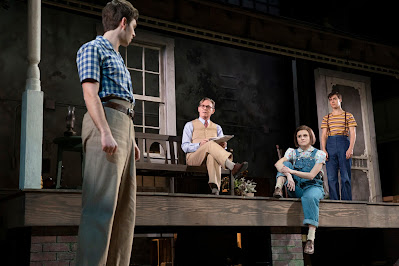Reviewed by James Karas
"You're going out there a youngster, but you've got to come back a star!"
Who can forget that marvelous line uttered by a director to a neophyte singer/dancer stepping out on the stage to perform a starring role for the first time? It captures the dream of every would-be performer. It engages the wish of every audience and provides vicarious satisfaction when it happens even in a fairy tale on the stage.
Welcome to 42nd Street, the 1980 smash song-and-dance musical that conveyed that fairy tale to the opening-night audience on Broadway who greeted it with a standing ovation. When the applause died down, they were informed that Gower Champion, the famous director of the production had died that day. Reality and fairy tale clashed head on.
David Mirvish has brought 42nd Street to the Princess of Wales Theatre with the fairy tale intact but without the unpleasant reality. He has imported the United Kingdom production directed by Jonathan Church.
42nd Street, more than a fairy tale, is a song and dance extravaganza, with spectacular tap dances, beautiful songs and glitzy costumes to light up everything.
The fairy tale. Peggy Sawyer (Nicole-Lily Baisden) from Pennsylvania arrives late for the casting of a new musical, Pretty Lady. We are treated to marvelous tap dancing that sends our heart pitter-patter in tune with the steps we witness. We meet the star of the show, the egotistical and sometimes obnoxious Dorothy Brock (Ruthie Henshall) who can sing in a delicious voice but can’t dance. She is accompanied by her sugar-daddy, southern boor Abner Dillon (Anthony Ofoegbu). But before we get there, we need some more dancing and a polite invitation to lunch to Peggy by tenor Billy (Olly Christopher) and a romantic song by the two, “Young and Healthy.”
Dorothy is a has-been but still a star and Henshall lends her luscious voice to several songs including the romantic “I only have eyes for you.”
The plot will inevitably involve some complications (we do have more than two hours to tell the whole story). Dorothy will be injured; Peggy will be fired and the show will be in serious danger of being cancelled completely. For tap dancing afficionados, there is a feast of routines done with precision, synchronization and gusto. The costumes have glitz and glamour and are a pleasure to watch. We are in the 1930’s and the dancers have the choice of accepting the job offers or going on the dole.
The music and songs of 42nd Street have the benefit of familiarity and they are melodic, memorable and beautiful. Dorothy sings “You’re Getting To Be A Habit With Me,” the Chorus and several dancers sing “We’re In The Money” and the cast serves up “Lullaby of Broadway”. Peggy and the Dancers sing “Forty-Second Street” and the result is, let me coin a phrase and quote David Merrick, the original producer, a song and dance musical extravaganza.
Let me praise the people on the stage that I have not mentioned already from Adam Garcia as the tough director Julian Marsh, to Josefina Gabrielle as co-writer and producer Maggie Jones and Michael Matus as co-writers and producer Bert Barry of Pretty Lady, the show they are putting on. I need hardly say that the ensemble of dancers is superlative. What they do is provided by the choreography and musical staging of Bill Beamer, what everyone is wearing and what they are playing in front and around them is the work Robert Jones, Lighting Designer Ben Cracknell, and Projection Designer Jon Driscoll.
The biggest credit for the
overall success must needs go the the director of 42nd Street (not
the fictitious Pretty Lady), Jonathan Church. He is highly adept at marshalling
the talent, energy, gusto and high caliber
performances to give us a superb evening at the theatre.
_____________________________________
42nd STREET by Harry Warren (music), Al Dubin (lyrics),
Michael Stewart and Mark Bramble (book) continues until January 21, 2024, at
the Princess of Wales Theatre, 300 King St. West, Toronto, Ontario. www.mirvish.com
James Karas is the Senior Editor, Culture of The Greek Press
.jpg)


%20and%20ensemble%20Photo%20Max%20Power%20Photography.jpg)










.jpg)
.jpg)



